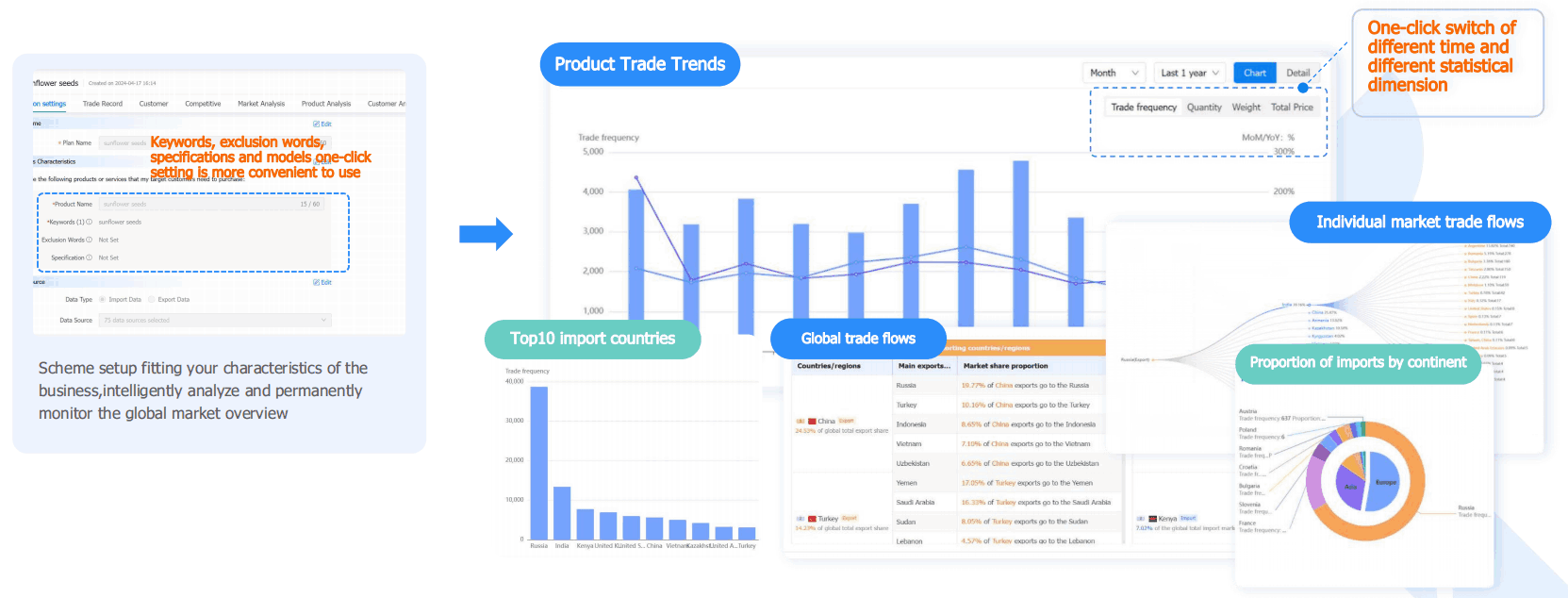 Trade Data
Trade Data
 2024-08-15
2024-08-15
Thailand, a key player in the Southeast Asian economy, has a dynamic and diverse import profile. The country’s import activities are critical for its manufacturing sector, domestic consumption, and overall economic growth. As a middle-income economy with a significant export base, Thailand relies heavily on imports of raw materials, intermediate goods, and capital goods to support its industries, particularly in automotive, electronics, and agriculture.

Key Import Categories
Machinery and Mechanical Appliances: Machinery and equipment form the largest segment of Thailand's imports. These include industrial machinery, electrical machinery, and electronic equipment, which are essential for Thailand’s manufacturing and electronics industries. The import of these goods is crucial for maintaining and enhancing the country's production capabilities, especially in the automotive and electronics sectors.
Mineral Fuels and Oils: Thailand imports a substantial amount of mineral fuels and oils, primarily crude oil, to meet its energy needs. The country’s lack of significant domestic oil production makes it heavily reliant on imports to power its industries, transportation sector, and households. The fluctuation in global oil prices can significantly impact Thailand's import bills and trade balance.
Chemicals: Chemicals, including organic and inorganic chemicals, pharmaceuticals, and fertilizers, constitute another significant portion of Thailand's imports. These chemicals are vital for various industries, such as agriculture, manufacturing, and healthcare, supporting the country's broader economic activities.
Automotive Parts and Components: As one of the world’s largest producers and exporters of automobiles, Thailand imports a considerable volume of automotive parts and components. These imports are necessary for assembling vehicles domestically, which are then either consumed locally or exported.
Electronics and Electrical Appliances: Thailand's thriving electronics sector requires a continuous supply of components, such as semiconductors, circuit boards, and other electronic parts. These imports are essential for producing finished electronic goods, which are a significant part of Thailand's export portfolio.
Click here to check Thailand's import data
Major Trading Partners
Thailand's imports are sourced from various countries across the globe, reflecting its integration into the global economy. Some of the major countries from which Thailand imports goods include:
China: As Thailand's largest trading partner, China supplies a wide range of goods, including electronics, machinery, and chemical products.
Japan: A key supplier of automobiles, machinery, and electronic components, Japan plays a crucial role in supporting Thailand’s industrial sectors.
The United States: The U.S. exports machinery, aircraft, and agricultural products to Thailand, contributing to the technological and agricultural sectors.
South Korea and Taiwan: Both countries are important suppliers of electronic components and machinery to Thailand.
Middle Eastern Countries: These countries, particularly Saudi Arabia and the United Arab Emirates, are major exporters of crude oil to Thailand.
Click here to check Thailand's import data
Trends and Challenges
Thailand's import data shows a consistent increase in the import of high-tech products, reflecting the country’s focus on modernizing its industrial base. However, Thailand also faces challenges, such as fluctuating global commodity prices, trade tensions, and exchange rate volatility, which can affect its import costs and economic stability.
Additionally, Thailand is striving to balance its trade deficit by promoting exports and encouraging domestic production of goods that are currently imported. The government’s policies aimed at boosting technological innovation and supporting local industries are expected to reduce the reliance on certain imports in the long term.
Click here to check Thailand's import data
Conclusion
Thailand's import data highlights the country’s significant dependence on global supply chains for its industrial and economic needs. By understanding the composition and sources of its imports, Thailand can better strategize to enhance its economic resilience and sustain its growth trajectory in the competitive global market.
Click here to check Thailand's import data
From traditional data retrieval to constructing business scenarios, Tendata T-Insight employs multiple analysts to work for you.
With intelligent market analysis, it assists in saving analysts' time and your money.
Eliminate the need for manual and frequent searches and analyses. With Tendata, you can effortlessly grasp product trade trends, trade flows, top 10 import and export countries with a single click, understand market trends, and identify high-value regions.

Category
Leave Message for Demo Request or Questions


 T-info
T-info T-discovery
T-discovery

 My
Tendata
My
Tendata Market Analysis
Market Analysis Customer
Development
Customer
Development Competitor
Monitoring
Competitor
Monitoring Customer Relationship
Customer Relationship





































































































































